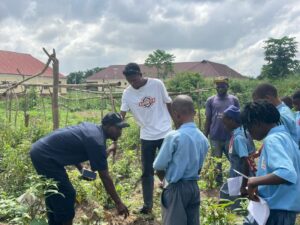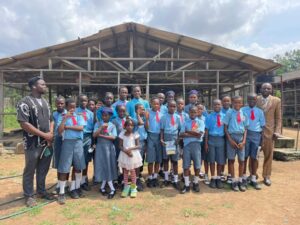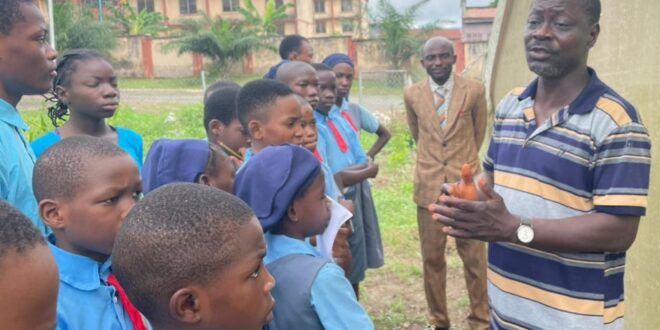BY AYODEJI ADEDOKUN
 IBADAN, OYO STATE, NIGERIA: November 17, 2025 – FCAIB recently hosted students from the Anglican Comprehensive College, Odo-Ona, Ibadan, with the aim of providing Students with hands-on experience and exposure to agricultural practices, research, and innovation, as well as foster a spirit of inquiry cum curiosity among the Students.
IBADAN, OYO STATE, NIGERIA: November 17, 2025 – FCAIB recently hosted students from the Anglican Comprehensive College, Odo-Ona, Ibadan, with the aim of providing Students with hands-on experience and exposure to agricultural practices, research, and innovation, as well as foster a spirit of inquiry cum curiosity among the Students.
The tour of the College commenced with a visit, first to the organic farm.
Mr. Ayo Adesanya- a Lecturer at the School of Agriculture, on behalf of the College Provost, Prof. J. J Atungwu and the Dean, School of Agriculture, Dr. C. O. Kayode, welcomed the Students and introduced them to the College’s programmes and facilities.
He explained that the College has various training Units: sheep, goats, dairy, poultry farms and engineering fabrication unit.
Mr. Adesanya further explained that farming is divided into two main categories: organic and inorganic farming.
He defined organic farming as the use of natural methods to enhance soil fertility and promote plant growth, without the use of synthetic fertilizers or chemicals and inorganic farming as a natural process that involves using God’s created enhancements and chemicals, such as fertilizer, to promote plant growth.
Mr. Adesanya noted that traditional farming is organic by default, but that inorganic fertilizers are often used to increase yields and meet the demands of a growing population.
He then highlighted the importance of organic fertilizers, such as wood shavings from poultry, and noted that advanced Countries use central sewage systems to convert waste into organic fertilizers.
Mr. Adesanya emphasized the importance of minimizing wastes and using organic materials to create fertilizers.
He took the students on a jaunt of the organic farm, where they learned about the different types of crops grown and the methods used to control pests and diseases without chemicals.
Mr. Adesanya explained that neem trees are used for temperature control and pest management.
The students were taken to the screen house, where they learned the importance of controlled environments for plant growth.
The screen house is made of netting to allow for easy access to air for plants that require a shade.
Oladele Ifeoluwa and Taofeek Azeez, serving corps members in the School of Agriculture, shared insights on organic farming, plants and their botanical names.
The Students were amazed at the pronunciation of some botanical names, while they toured the garden to learn about plants, their growth and general development.
The students at the Piggery Section learned the importance of pig farming its nutritional and economic benefits and introduced to the different breeds of pigs, including the Large White, Landrace, and Duroc breeds.
The various stages of pig production, from breeding to farrowing, and shown the piglets and sows samples, with enlightenment given on the importance of proper feeding, breeding, and disease control in pig farming, with an emphasis that pig farming is a lucrative business, as anyone can become a millionaire within 18 months.
The importance of hygiene was stressed, citing the risk of disease outbreaks that can wipe out the entire piggery within a few days and that pigs possessed a keen sense of smell and are often referred to as swines due to tendencies to thrive in dirty environments. Pigs were described as ferocious eaters, that feed on a combination of natural produce.
The visit included a demonstration of pig feeding and handling techniques, which thebt students found engaging and informative.
The last visit was to the poultry, where
Mrs. Bamibe Iwadunni, a staff of the Unit explained the basic components of the poultry facilities: drinker and feeder with a demonstration of their use and that the birds were usually fed manually with a sequential procedure of grower, starter and finisher feeds.
She then explained the differences between broilers and layers, noting that layers are commonly known for producing eggs, while broilers are typically raised for meat production.
Mrs. Bamibe explained that layers begin laying eggs at a certain age, and the eggs are taken to the hatchery for incubation and hatching into chicks while she clarified characteristics of cockerels (male) chickens, which often are white and black in colour.
She explained that poultry birds are commonly kept in cages and backyards, and that chicken feeds can be produced manually using soyabeans, corn bran, wheat, and calcium.
Mrs. Bamibe explained that commercial feeds are often pelitized, that is, processing the feed into a compact, rice-like form.
She also stressed the importance of disease control in healthy birds, with the administration of drugs and vitamins, regular checks for any sign of illness such as chicken pox, farm pox, blue comb, newcastle disease etc, with the importance of vaccination and proper management practices to prevent disease outbreaks.
Post-mortem examinations are however usually conducted to determine the cause in the eventuality of death.
The Students posed questions and Mrs. Bamibe provided detailed explanations on the injection methods used to administer vaccines and other treatments to the birds.
The visit however gave the students an opportunity to gain valuable knowledge and insights into agricultural practices, research, and innovation.
The Management of St. Paul’s Anglican Comprehensive College, Odo-Ona Gada, Ibadan, and the Students expressed deep appreciation to the Provost and Management of the Federal College of Agriculture, Ibadan, for the opportunity to visit and learn from the College’s expertise.
 Startrend International Magazine For Your Latest News And Entertainment Gists
Startrend International Magazine For Your Latest News And Entertainment Gists





